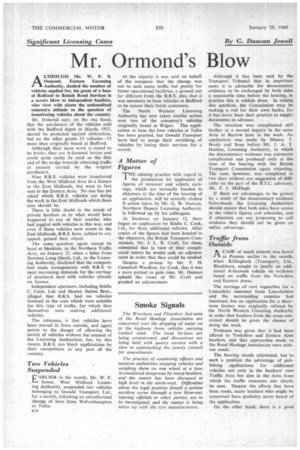Mr. Ormond 's Blow
Page 48

If you've noticed an error in this article please click here to report it so we can fix it.
ALTHOUGH Mr. W. P. S. Ormond, Eastern Licensing Authority, slashed the number of vehicles applied for, his grant of a base at Bedford to British Road Services is a seyere blow to independent hauliers, who view with alarm the nationalized • concern's attitude to the question of transferring vehicles about the country.
Mr. Ormond says, on the one hand, that the purchasers of the vehicles sold with the Bedford depot in March, 1955, should be protected against abstraction, but on the other grants 33 vehicles-13 more than originally based at Bedford.
Although their main work is stated to be bricks, they are A-licensed lorries and could quite easily be used as the thin end of the wedge towards obtaining traffic at present carried by the original purchasers. Nine B.R.S. vehicles were transferred from the West Midland Area to a licence in the Fast Midlands, but were in fact sent to the Eastern Area. No one has yet asked which B.R.S. vehicles are doing the work in the East Midlands which these nine should be.
There is little doubt in the minds of private hauliers as to what would have happened to any of their number who had juggled with vehicles in this way, and even if these vehicles now revert to the East Midlands, B.R.S. have, subject to any appeal, gained their object.
The same question again reared its head at Stockton, in the Northern Traffic Area, on January 12, when a letter from Dorman Long (Steel), Ltd., to the Licensing Authority, disclosed that the company had made arrangements with B.R.S. to meet increasing demands for the carriage of structural steel with vehicles already on licence.
Independent operators, including Siddle C. Cook, Ltd. and Messrs. Sunter Bros., alleged that B.R.S. had no vehicles licensed in the area which were suitable for this type of traffic, for which they themselves were seeking additional vehicles.
The inference is that vehicles have been moved in from outside, and again points to the danger of allowing the switch of vehicles without the consent of the Licensing Authorities, for, by this means, B.R.S. can block applications by their competitors in any part of the country.
Two Vehicles Suspended
EARLIER in the month, Mr. W. P. ,.1-4 James, West Midland Licensing Authority, suspended two vehicles belonging to Oswald Transport, Ltd., for a month, following an unauthorized change of base from Wolverhampton to Talke.
At the inquiry it was said on behalf of the company that the change was not to seek more traffic but purely for better operational facilities, a ground not far different from the B.R.S. plea that it was necessary to base vehicles at Bedford to be nearer their brick customers.
The North Western Licensing Authority has now taken similar action over two of the company's vehicles originally based at Wigan. The application to base the four vehicles at Talke has been granted, but Oswald Transport have had to purge their switching of vehicles by losing their services for a month.
A Matter of Figures
THE existing practice with regard to the production by applicants of figures of turnover and vehicle earnings, which are normally handed to objectors at the time of the hearing of an application, will be severely shaken if action taken by Mr. G. W. Duncan, . Northern Deputy Licensing Authority, is followed up by his colleagues.
At Stockton on January 12, there began an application by Siddle C. Cook, Ltd., for three additional vehicles. After copies of the figures had been handed to the objectors, the British Transport Commission, Mr. J. L. R. Croft, for them, submitted that in view of their complicated nature he would seek an adjournment in order that they could be studied.
Despite a protest by Mr. T. H. Campbell Wardlaw, for Cook, that it was a mere pretext to gain time, Mr. Duncan upheld the views of Mr. Croft and granted an adjournment. Although it has been said by the Transport Tribunal that in important cases it is advisable for documentary evidence to be exchanged by both sides a reasonable time before the hearing, in practice this is seldom done. In raising this question, the Commission may be making a rod for their own backs, for it has never been their practice to supply documents in advance.
The situation was complicated still further at a second inquiry in the same Area at Barrow later in the week. An application was made by Messrs. T. Brady and Sons before Mr. J. A. T. Hanlon, Licensing Authority, in which the documentary evidence was extremely complicated and produced only at the time of the hearing with the British Transport Commission again objecting. The case, however, was completed in two days without any suggestion of difficulty on the part of the B.T.C. advocate, Mr. F. J. McHugh.
If there are advantages to be gained by a study of the documentary evidence beforehand, the Licensing Authorities should ensure that both sides have access to the other's figures and schedules, and if objectors are not proposing to call evidence they should not be given an unfair advantage.






































































































